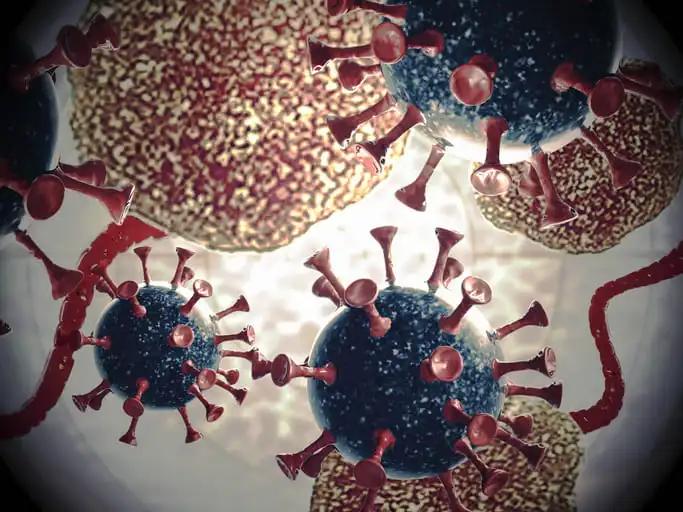KEY TAKEAWAYS
- This phase II study assessed glofitamab, a CD20xCD3 bispecific antibody, in patients with relapsed/refractory Large B-cell Lymphoma (LBCL).
- The study included patients with LBCL who had undergone at least two prior therapies and received a fixed course of 12 three-weekly cycles of glofitamab.
- Glofitamab demonstrated durable responses, with most patients in CR remaining in remission at EOT without new AEs.
In this phase II study, patients (pts) diagnosed with large B-cell lymphoma (LBCL) who had undergone at least two prior treatment regimens were included and administered 1000 mg obinutuzumab seven days before the initial dose of glofitamab. Intravenous administration of glofitamab followed a step-up dosage approach: 2.5 mg on Day (D) 1 of Cycle (C) 1, 10 mg on C1D8, and 30 mg (target dose) on D1 of C2–12 (21-day cycles). The main objective was to evaluate the complete response (CR) per an independent review committee (IRC). For pts showing a CR either by Cycle 3 or after the treatment, subsequent analyses were conducted to assess progression-free survival (PFS) and overall survival (OS).
By October 10, 2022, 154 pts had administered ≥ one dose of the study treatment, and their initial characteristics matched those previously disclosed. The median count of prior therapies was 3, ranging from 2 to 7;33% of the pts had previously undergone CAR T-cell therapy, and 85% displayed refractoriness to their most recent therapy regimen. The median duration of the study was 20.1 mos, ranging from 0 to 32 mos.
The investigator-assessed complete response rate (CR rate) at the best overall response (BOR) was 38% (40%, according to the Independent Review Committee [IRC]), and the overall response rate was 59% (52% by IRC). The CR rates remained consistent, whether pts had prior CAR-T therapy (37% vs. 39%). After a median follow-up of 18.3 mos (ranging from 0 to 30 months) in pts who achieved a CR at BOR, most of these complete responses (39 out of 59; 66%) were ongoing, and the median duration of complete response (DoCR) was 24.1 mos (95% confidence interval: 19.8–not estimable [NE]). An estimated 70% of pts who achieved a CR at any point remained in remission at the 18-month mark. The 18-month OS rate was 41% (95% CI: 32.1–49.3). On conducting landmark analyses at one year, pts who achieved a CR before the third cycle of treatment (PFS: 71%, OS: 92%) and those who had a CR at the end of treatment (PFS: 80%, OS: 94%), showed that most pts were progression-free and alive. In a subgroup of 101 pts treated with glofitamab doses lower than the recommended Phase II dose but at least 10 mg, and with a longer median follow-up for CR (31 mos, ranging from 1 to 49), the median DoCR was 30.1 mos (95% CI: 5.5–NE), and 55% of pts were still in remission at the data cut-off point. This also demonstrated the highly durable responses accomplished with glofitamab.
Cytokine release syndrome (CRS), as per the American Society for Transplantation and Cellular Therapy (ASTCT), remained the most frequently occurring adverse event (AE), affecting 64% of pts, mostly Grade 1 (48%) or Grade 2 (12%) severity. In comparison, Grade 3 (3%) and Grade 4 (1%) events were rare. In contrast to earlier analyses, the incidence of AEs and serious AEs remained consistent, with the addition of one new Grade 3 AE (acute kidney injury), one new Grade 2 neurologic AE (agitation), and no newly reported Grade 5 AEs related to glofitamab.
The persistence of durable responses with glofitamab remains evident, as most pts who achieved CR at the EOT maintained their remission status without encountering new adverse events (AEs). These findings support the possibility of positive long-term results with the fixed-duration use of glofitamab for relapsed or refractory large B-cell lymphoma (R/R LBCL). Further analyses, encompassing a larger patient cohort and a median CR follow-up of around 20 mos post-EOT, will be shared for a more comprehensive understanding.
Source: https://onlinelibrary.wiley.com/doi/10.1002/hon.3163_95
Clinical Trial: https://classic.clinicaltrials.gov/ct2/show/NCT03075696
Dickinson, M., Carlo-Stella, C., Morschhauser, F., Falchi, L., Bachy, E., Cartron, G., Khan, C., Tani, M., Martinez-Lopez, J., Bartlett, N., Salar, A., Brody, J., Leppä, S., Mulvihill, E., Lundberg, L., Relf, J., Xie, Y., Bottos, A., Humphrey, K., Hutchings, M. GLOFITAMAB MONOTHERAPY IN PATIENTS WITH RELAPSED/REFRACTORY (R/R) LARGE B-CELL LYMPHOMA (LBCL): EXTENDED FOLLOW-UP AND LANDMARK ANALYSES FROM A PIVOTAL PHASE II STUDY https://onlinelibrary.wiley.com/doi/10.1002/hon.3163_95



